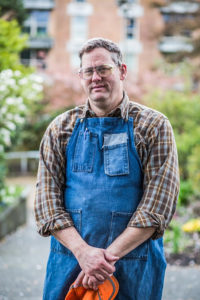John Romish
Independent
By Suzanne Yeagley

John Romish is one of about 35 DeafBlind people who work at The Lighthouse for the Blind, Inc.
John grew up in Boston but moved to Portland, OR when he was sixteen years old. It was during high school that he started having difficulty with his vision, tripping over a chair and knocking into another student. It was then, that he learned he had Usher syndrome. He was born deaf and would eventually lose his sight.
John graduated from high school and went on to attend Portland Community College, where he got a certificate in offset printing in 1983. During his college years, he traveled to Seattle for a conference with the American Association of the DeafBlind (AADB) at the University of Washington. During his time at the conference, they offered a tour of the Lighthouse. “I saw that the Lighthouse tour was happening, but I chose not to go,” he says. “I was a college student at the time. But it was something I kept in my mind.”
It wasn’t until 10 years later, in July 1994, that John and his parents would tour the Lighthouse. “That was back in the day when they were making ladders and using a punch press,” he says. “I got a sense of it, but I wasn’t ready at that time; I had a job elsewhere. I had enough vision that I could do that job. Then I was laid off and I decided to apply here,” he continues. “I was only unemployed for three months before I got hired here. Now I’ve been here 21 years.”
When he started at the Lighthouse in 1997, John was 33 years old and still had most of his sight. The Lighthouse was a new experience for him. “When I started, I was getting my legs hit with canes, and it wasn’t like companies where I’d worked before. I started getting upset, but then I realized this was the environment here, there were a lot of blind people and that was how it was.”
But after some initial challenges, John learned to run a variety of the equipment used to machine airplane parts.
“I love it here,” he says. “It’s so much more accessible than the job I had before. There is the trailing lines — the yellow trailing lines around the shop — so I can feel it and see it with my cane… They have blue doors for the restrooms and supervisor’s office doors, so if you have some vision, it’s easier to distinguish. They’ve developed a lot of accommodations here for folks.”
John had 20/70 vision when he moved to Seattle. Now it’s about 20/200. “It’s been a slow progressive loss,” he says. “In high school, it was maybe 20/40.” John had a private teacher in high school who worked with him to learn braille, among other useful skills. “I knew it was important to learn braille, tactile sign language and typing; those were all skills I would need at some point, because eventually I would become completely blind.”
John lives in First Hill with his guide dog Johnny in a place he bought for himself. John’s previous dog, Addy, passed away in 2015 and the following year, he got Johnny. When asked if it’s convenient that the dog’s name is so similar to his own, he said it did help him vocalize with Johnny. Speaking through his interpreter, he makes a few dog calls, teasing that he knows the translator is not a dog. John brings Johnny to work and leaves him in the kennel. Johnny has gotten to know John’s home, his bus routes, workplace, church, and friends. “He’s basically my GPS,” John says.
At the Lighthouse, John worked on many different machines, and from 2005-2014 was the main person on the punch press. He trained another DeafBlind man, John James, who has since taken over as John moved to routers. About the job, John says, “It’s a lot of work, a lot of memorization. There are some complicated pieces to my job, for sure. You just have to be diligent.”
In his spare time, John likes to take walks with his dog, read his email, socialize with others in the DeafBlind community, go to his parents’ home, and attend church. “I don’t want to be dependent on anybody,” John states. “I don’t want to feel like I’m not capable to do things myself. That’s one of the things I appreciate about the Lighthouse,” he says. “I’ve learned so much about my own ability to be autonomous, to get to and from work by myself, and to do my job. I’ve become more independent in the last few years.”
“In general, I’m just so thankful. I hope the Lighthouse continues to get contracts and continues to be here,” he says. “There’s a lot I appreciate.”